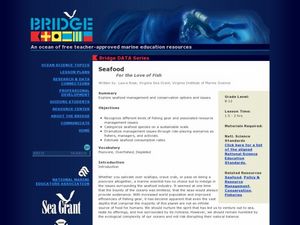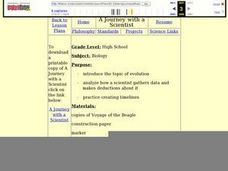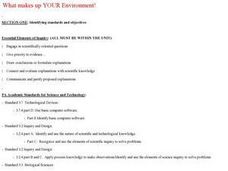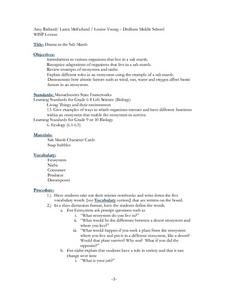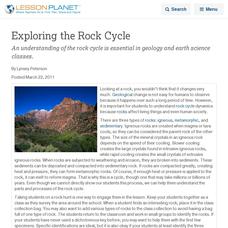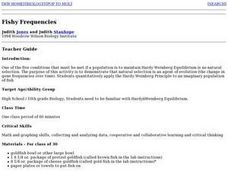Virginia Department of Education
Predator-Prey Simulation
Do your pupils have the misconception that environmental predators are "bad" and harm smaller creatures? The simulation explains, in detail, the important role predators play in maintaining a stable ecosystem. Through web-based research,...
Curated OER
Seafood: For the Love of Fish
Students role play a scenario specific to decision making in seafood management and conservation. In this marine science instructional activity, students estimate seafood consumption in their state. They recommend new regulations for...
Curated OER
Outbreak!
Eleventh graders explore the spread of a disease through a population. In this Algebra II lesson plan, 11th graders analyze graphical data representing they spread of a disease. Students produce a graph of the virus data, analyze the...
Curated OER
The Theory of Evolution
In this theory of evolution worksheet, students review vocabulary words associated with evolution including the different types of evolution patters. This worksheet has 5 true or false and 5 matching questions.
Curated OER
Patterns of Evolution and Selection
Can your young biologists interpret population graphs, match macroevolution patterns and descriptions, and answer multiple choice questions about evolution? Find out with a comprehensive three-page quiz covering some specific examples of...
Curated OER
A Journey with a Scientist
Pupils work in groups as they read chapters of Charles Darwin's, Voyage of the Beagle. They take notes on the chapter and in their group make a timeline of the chapter. They tape the timelines together in order to depict the entire...
Curated OER
Plant Life Cycle
Fourth graders explore the plant life cycle. They discuss the sequence of events in the life cycle of the plant and illustrate how the life cycle never ends. Students explore the importance of water, sunlight, and nutrients during the...
Curated OER
What makes up YOUR Environment!
Learners create their own land or water environment. They make their environment livable for all the different animals they collect to put in it. Students research the types of animals that they can have in their environment, and how...
Curated OER
Drama in the Salt Marsh
Students are introduced to the various organisms that live in a salt marsh. They recognize adaptations of organisms that live in the salt marsh. Pupils review concepts of the ecosystem and niche. Students explain the different roles...
Curated OER
The Effects of "Recreational" Drugs on the Development of Chick Embryos as a Model for Human Embryogenesis
Students conduct experiments on fertilized chicken embryos to determine the possible developmental effects that various recreational drugs (caffeine, alcohol, nicotine, and aspirin) might have on them.
Curated OER
Creative Ways To Teach Evolutionary Concepts
Research how DNA, the genetic blueprint of living organisms, plays an essential role in the continuity of life. High schoolers will summarize how their influence may very well effect the destiny of the population from one generation to...
Facing History and Ourselves
What Makes Memphis a Community?
Sixth graders explore the community identity of Memphis, Tennessee. After examining primary and secondary sources, class members describe the city and its attributes that make it a unique community.
Curated OER
Exploring the Rock Cycle
An understanding of the rock cycle is essential in geology and earth science classes.
Teach Engineering
Skeletal System Overview
It is best to know all about the skeletons in the closet. The third segment in a five-part series focuses on bone structure, development and growth, and functions. Class members connect what they learn to their study of osteoporosis.
Curated OER
Floristic Relay
Fifth graders identify the role succession plays in the adaptation of our environment. Students identify pioneer and climax species and order habitats in succession. They recognize that different characteristics of species make them...
Curated OER
Dogs & Darwin
Ninth graders construct and conduct a laboratory experiment illustrating the transfer of mutations. They compare and contrast natural selection in organisms with long and short reproductive cycles.
Curated OER
Learned Behavior
In this learned behavior activity, students review different types of learned behavior including habituation and trial-and-error learning. This activity has 7 short answer, 8 matching, and 10 fill in the blank questions.
Curated OER
Genetic Disorders with Cultural Roots: International Insects
Students recognize that certain populations have specific genetic disorders that could benefit or harm them in their environment, work out punnett square problems and infer offspring probabilities from results, and provide advantages and...
Curated OER
Reading: A Talk on the Effects of Music on Our Brains
In this reading an interview transcript worksheet, students read the transcript from an interview with Daniel Levitin who was a psychologist interested in the effects of music on the human brain. Students then answer 10 true and false...
Curated OER
Tadpole Diary
Second graders examine the life cycle by observing tadpoles. After reading the book, Tadpole Diary, they draw the stages of tadpole development and write sentences about what they think is happening.
Curated OER
Fishy Frequencies
Tenth graders demonstrate that natural selection is an agent of evolution. They quantitatively apply the Hardy-Weinberg Principle to an imaginary population of fish. They utilize math and graphing skills, collecting and analyzing data,...
Curated OER
They're more evolved that way
Students explore the notion of local evolution, or genetic selectivity among different continent-based human populations. They consider specific examples of local evolution, such as lactose tolerance, skin color, and cognitive capacity,...
Curated OER
Ghost in Your Genes
Students explore DNA microarrays. In this genetics instructional activity, students model DNA microarrays that are used by scientists. Students work to determine levels of breast cancer genes in patients. They will determine the...
Florida International University
Design Your Own
Apply scientific principles to designing an experiment to study organisms living on the coral reef in our oceans. Through reading, individuals learn about the coral reef ecosystem and important factors that affect its function. Using the...



